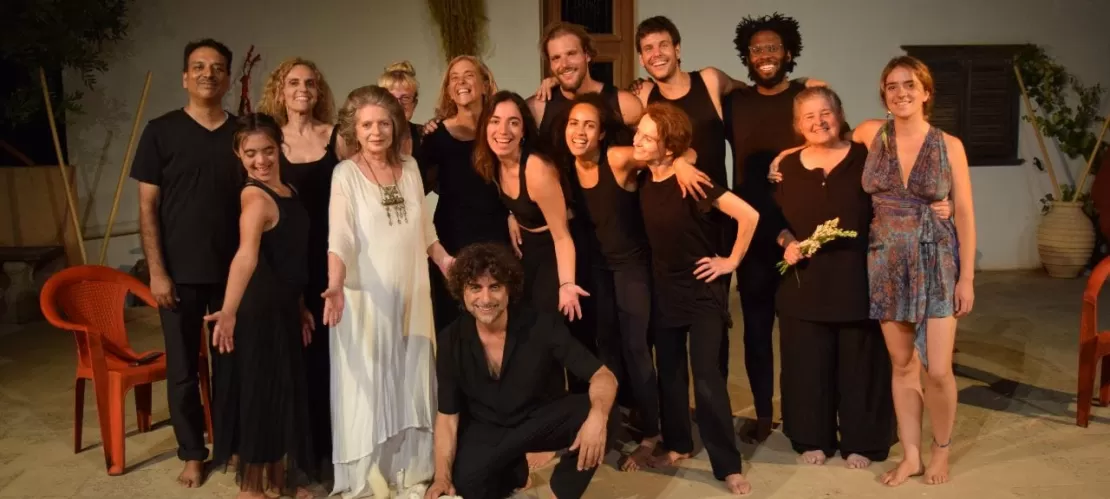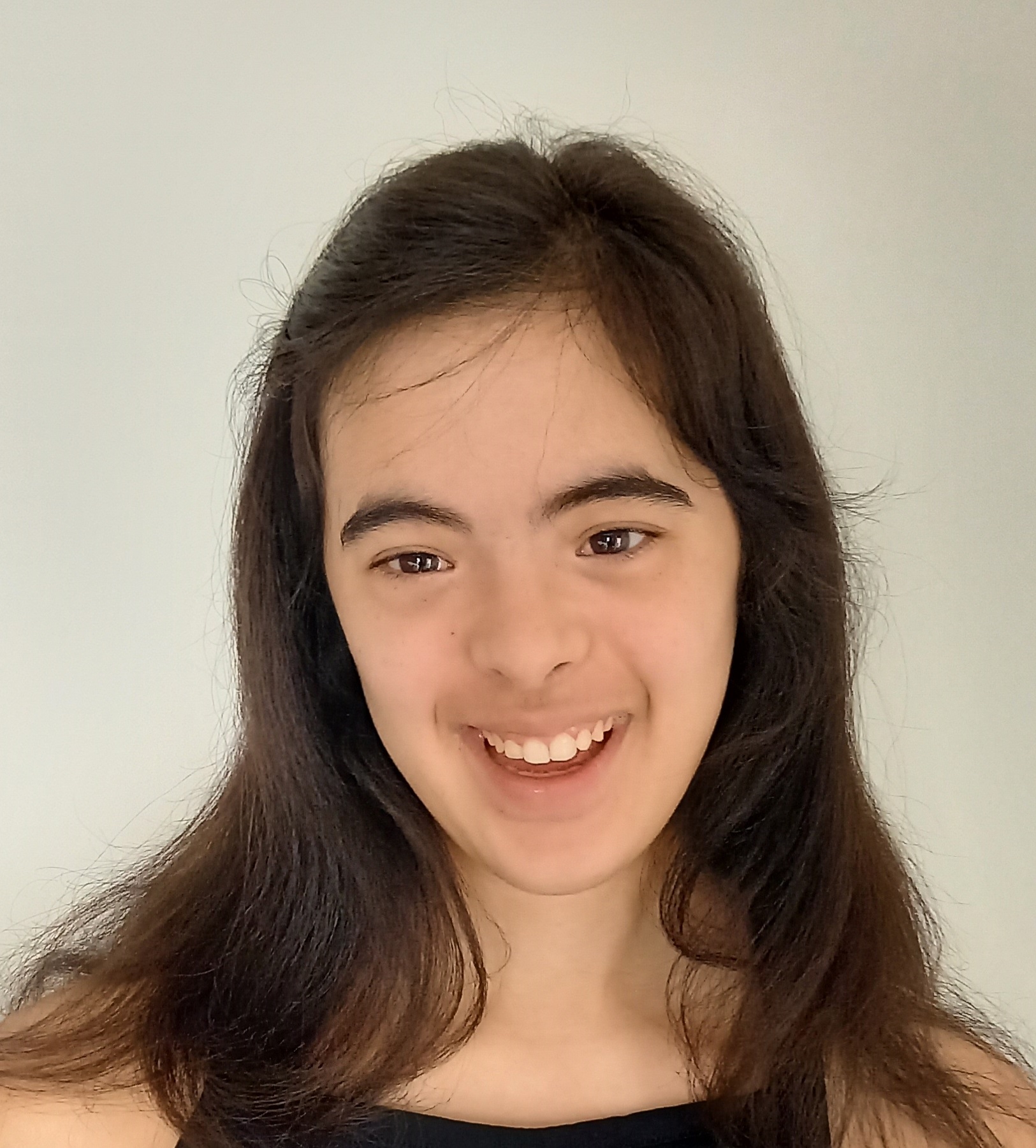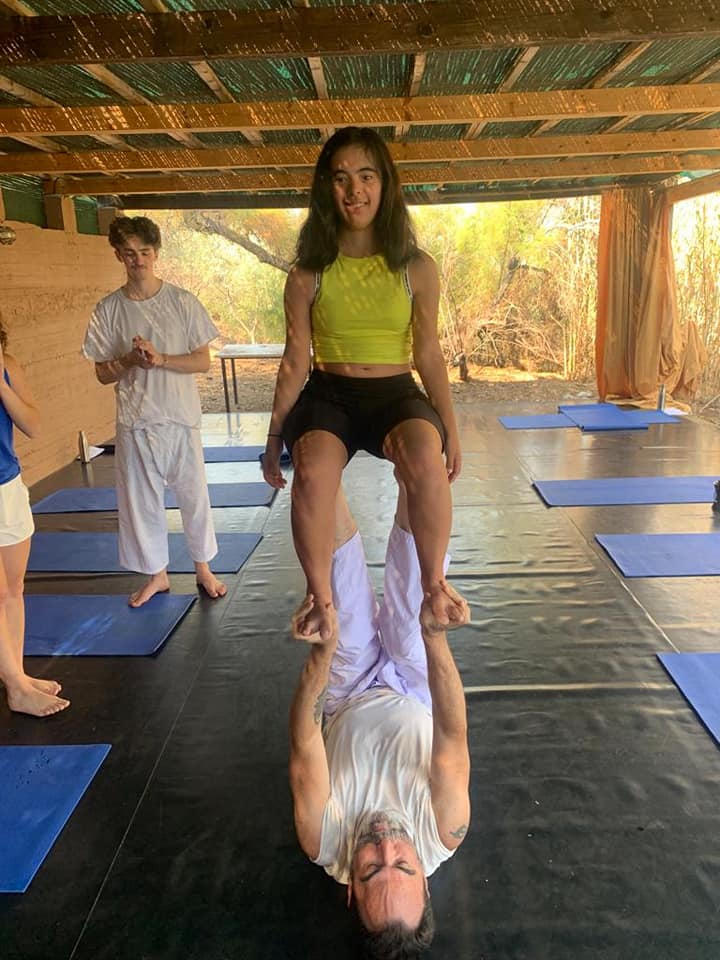
Hello, my name is Angela Bettoni, and I am a writer, performer and disability rights advocate with Down Syndrome. I am a student at the Malta College of Arts, Science and Technology (MCAST), starting my last year in the BA of Creative Arts this October.

This year, thanks to the Erasmus Traineeship programme, I had the chance to go to a Greek island called Hydra, where I spent more than a month working at the Hydrama Theatre and Arts Centre, which was founded in 1999 by Corinna Seeds.
As part of my Erasmus, I also did the course called “Acting to the Gods” there. It was a two-week intensive drama course for actors, theatre professionals, teachers and drama students. The course was an opportunity to train intensively, rehearse and perform in a Greek amphitheatre and learn about the roots of Eastern theatre. Before I set off to Hydra to start my Erasmus, I did my own research on Hydrama. I visited their website and read up on everything that they had done in the previous years.
My Erasmus experience was split in two. The first part was not really acting as that would come later. I actually started by observing a group of visual arts students from the NSCAD University in Canada who were there to work on their new art installation projects. I attended a few workshops with them and a few of their lectures; one that I found very interesting was a lecture from a Greek documentary filmmaker called Anneta Papathanasiou, who has filmed documentaries in high-risk countries like Afghanistan (some of her works include ‘Laughing in Afghanistan’ and ‘Playing with Fire’).
I also got the opportunity to watch a Balinese performance called “The Total Actor”, which is a theatrical performance of Balinese drama, dance and arts performed by I Wayan Bawa. In fact, I even recorded my own interviews with Corinna Seeds, Anneta Papathanasiou, Dr Peggy Shannon and I Wayan Bawa, and I really learnt a lot from them! I also observed the American Proboscis Theatre Company during their time at Hydrama while shadowing their director, Jeff Mills.
Through this, I got to experience the genesis of a performance based on ancient Greek mythology. I even got the chance to contribute to their performance as their director asked me to write a monologue around the topics of disability, exclusion and inclusion. I got to perform the monologue for them, and some lines of it even went into their final script. I joined them in the mornings to do acro yoga (acrobatic yoga), which is a physical practice that combines yoga and acrobatics.

On the 21st of July, I began my course on “Acting to the Gods”, where I spent two weeks living on my own with a very international group of 11 people from America, Croatia, Türkiye, Denmark, Poland, Spain, Italy, India and Hydra. Together, we worked on a production of “The Bacchae” by Euripides. “The Bacchae” is regarded as one of his best works and one of the greatest of all Greek tragedies. It’s the myth of King Pentheus of Thebes and his mother Agave, who were punished by the Greek god Dionysus. We worked under the excellent direction of one of Greece’s most celebrated directors, Kostas Gakis, who is also an actor and composer.
What was very nice about the crowd that I was working with was that they were all older, hence more experienced than me. The younger ones were in their late 20s and early 30s, and some of them were teachers and parents; they were a real help since, thanks to them, I learned how to manage living on my own. For example, one of them once showed me how to wash my clothes, as there were no washing machines at our disposal. Another person taught me how to change the bed sheets. I also felt safe knowing they were keeping an eye out for me and looked after me in their own way. What was amazing about this crowd was that we quickly became a family. With Kostas, we formed a very tight community and tribe.
The process of working on “The Bacchae” was very interesting. When we first started and were given the script, all of us thought that it would be mainly a two-man show because of the casting that had already been done, but it took a turn that no one really expected. What made our performance go this way was that Kostas designed it to be very workshop-oriented at first. Here are some extracts from the journal that I was keeping throughout my whole Erasmus experience, which I hope will give you a good insight into my experience.
In one of our workshops, Kostas gave us an exercise to read through the script and come up with our own interpretation of “The Bacchae”. Then we showed everyone the work that we had done individually.
That evening, after dinner, we had our very first late-night rehearsal where Kostas invited everyone down to the restaurant on the beach, bringing his guitar, and got us to work on one of the songs that he had written for us. We were promised that it was going to be fun, but it ended up being hard work, and there was no room for fun. This created some tension within the group but was very quickly resolved the next day. The following morning, Kostas told us that he wanted us to rewrite the whole performance of “The Bacchae”. He told us that he had really liked what he saw in the workshop when we were giving our interpretations of the story and that he would like us to become our own directors of the performance. He said that he would be giving us three pages of the script for us to personalise so everyone could express their own artistic freedom.
Some of us, including me, were very eager and enthusiastic about this idea, but some were a bit reserved about it. So Kostas gave us the freedom to write to him personally on WhatsApp about how we felt about the idea, and then the following morning, he announced that we would be rewriting the whole performance! Kostas then split us up into two different groups for the chorus, group A and group B. In my case, I was paired up with the original actor of Dionysus as I was intended to play his puppet. At first, we were working separately, but then we came together and shared our ideas for the dance that I would be focusing on.
go next as a performer. I’m really excited about that adventure, and I’m really looking forward to it. Very, very looking forward. Performing in my very first ancient Greek performance in a very beautiful setting: Hydrama’s Greek amphitheatre.
It was also fun when we shared what we had worked on with everyone in our small group and gave them instructions on what they had to do in the piece as the chorus. They really made it come even more alive, and it was really taken to a different level when Kostas added his own music and beat to the dance. My daily programme was that we would have breakfast at 9 at the restaurant on the beach, come up to Hydrama (where we would rehearse until 2 pm), have lunch, then have a short siesta, afternoon rehearsals, time to tune down while watching one of Hydra’s beautiful sunsets, dinner at 9 pm and cast bonding afterwards (during production week we would also be rehearsing after dinner). I always enjoyed rehearsing in the night under the warm starry sky, exposed to all the natural elements.
Really crazily loving it.
Even though we were rehearsing intensely day and night, when it came to production week, it was actually really fun and not at all stressful. What I was very impressed with was how professional our production week was; it was always very fast and very efficient. All of us were fully dedicated and committed to what we were doing. I will always remember the dress rehearsal the night before the performance. It was after dinner, and we were working in the outdoor theatre with our costumes and the stage lights, and it could not
have gone better.
We were meant to be walking through the performance quietly so we wouldn’t wake up the whole Hydra, as when you project in the theatre, your voice can be heard throughout the small island. But in the end, we were performing it full out, and it was just amazing. One of the best dress rehearsals I ever took part in. The day of the performance was not about relaxing before the show; instead, it was a working day for us. We spent the morning having one full run-through of the whole performance and any other scenes that were in need of being refined, and in the afternoon, we ran through the whole performance one last time but with low energy.
I still remember the amazing feeling of watching the audience fill up the theatre till there was no room left for anyone to sit, the lights going down for the show to start and having a group hug with my friends to motivate each other. When the lights went up, WOW! Everything just came alive, with bright colours flying everywhere. It was just amazing. It was also so much fun performing in an outdoor theatre in the night with all the stars shining down on us.
Article By Angela Bettoni
